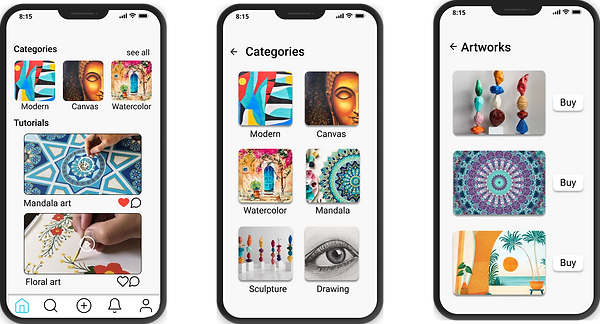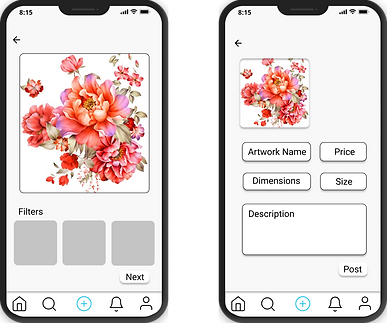Deepika Jain

Art+
A platform for artists who want to sell their artwork and create a community.
Role
Tools
Research, ideation, design, prototype
Figma, Google forms
Duration
2 months
Problem
Artists are struggling to connect with other artists and potential art buyers by being a part of an art community. They are having difficulty engaging. Other online platforms are not curated for artists and place a high value on online visibility.
Goal
Online platforms have always been a safe haven for diverse perspectives. By designing Art+, I hope to make artists' voices heard as well. Our goal is to design a prototype to make an accessible art platform where artists can easily collaborate, freely share their work, and sell their work.
Design process

Empathize
Survey
User Interviews
Comparative analysis
Affinity diagram
Define
Design challenge
User personas
User journey
Ideate
User stories
Sitemap
Userflow
Prototype
Sketches
Lo-fi wireframes
High-fi wireframes
Test
Usability testing
Empathize
Quantitative research: Survey
Using the google form I constructed a survey and sent it out to our users and managed to get 18 responses. Below are the results of our survey:






Qualitative research: User interviews
I did a Zoom interview call with 5 users, and found interesting insights from the interview. The folks interviewed were all very friendly, and they were able to chat with me very openly.
I prepared some questions in advance to be able to collect all the inputs we wanted to get from them.
Below are the insights we got through the user interviews:
-
There is not enough solidarity within the artist communities and that can prevent us from making ourselves known
-
They would like to be able to extend my network of contacts and be able to discover new artists.
-
The visibility of price is really very important
-
Appreciating other artists' work is really very interesting
According to the interviews conducted with the potential users, the following 3 problems need to be solved:
a) Artists in the visual art industry require a platform to present their artworks. Online platforms can bring them more exposure to collectors.
b) Artists need inspiration while creating new artwork
c) Artists need a platform to connect while carrying out collaborative works.
Comparative analysis

Below are the 4 key findings from the comparative analysis:
-
Our product should support artists in exposing their artwork to art enthusiast buyers
-
Creating profiles for artists and showcasing their work
-
Connect with art galleries for events/exhibitions
-
Ease of networking to connect with other artists
Affinity diagram
After analyzing the data gathered from the research, I have organized them into 4 groups using affinity diagram

Define
Design challenge
How might we sell our artwork and get exposure?
How might we get inspired and improve our art?
How might we connect with other like-minded artists?
How might we get the opportunity to carry out collaborative work?
User personas
.png)
.png)
User Journey
Let’s have a walkthrough of Eva Jacob’s journey to sell and connect with people using existing methods.
.png)
Ideate
User stories
Creating user stories helps to understand features from the end user’s perspective.
-
As an artist, I want to upload my art so that everyone can see it
-
As an artist, I want to follow another artist so that I can get inspired
-
As an artist, I want to save the art on a wish list so I can review it later
-
As an artist, I want to discover new collectors and artists so I can expand my network
-
As an artist, I want to like other artists' work so that my connection can see
-
As an artist, I want to collaborate with other artists, so it will help me learn new skills and expand my connection
-
As an artist, I want to be able to like other artworks in my community so I can help them gain visibility
-
As an artist, I want to find new contacts very quickly so I cannot waste too much time
-
As an artist, I want to show the real price of my works so I cannot encourage people to negotiate
-
As an artist, I want to know about the events and exhibitions happening in my location so I can showcase and sell my work
-
As an artist, I want to share my experience information so I can show my background and my notoriety.
Information architecture

User flow diagram

Prototype
Sketches
Using the crazy 8's technique, I developed some design sketches and transformed them into wireframes

Lo-fidelity wireframes
Further developed the above designs into a lo-fi wireframes, as shown below
.png)
High-fidelity wireframes
.png)




Usability testing
I did the usability testing with 5 people via a zoom video call. During the process, I asked about the features and usability of this app, and below are the insights from the testing.
-
5 out of 5 people found this app familiar to Instagram, but only for artists
-
5 out of 5 people found it easy to navigate
-
4 out of 5 people were pleased to see the options to collaborate with other artists
-
4 out of 5 people were happy to discover that they could easily connect with art galleries for events/exhibitions
Project takeaways
This was the first project that I had ever done and it was done from scratch. I learned a lot while working on both the UX and UI processes.
Main knowledge that I gained during this project:
-
Empathizing with target users is incredibly important as well as recruiting the right users. People can give valuable insights if asked the right questions, which can have a direct effect on the final solution.
-
Always pay attention to details, as these small changes create a huge difference on user experience



.png)
